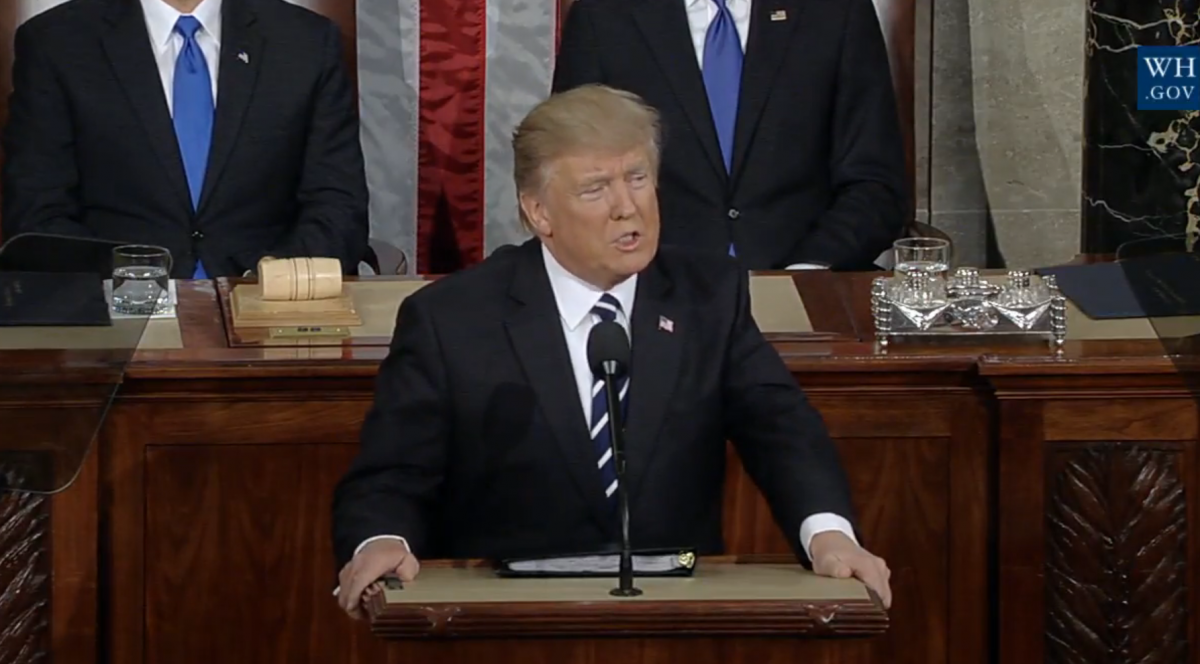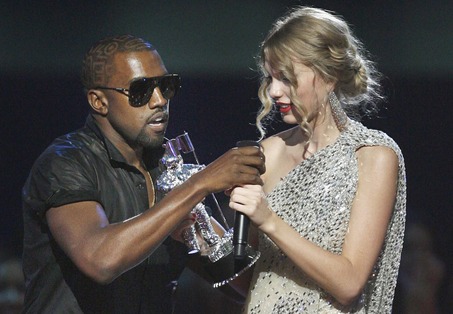Last night’s State of the Union speech was a masterstroke of psychological warfare against the American public. Donald Trump lightened his bellicosity after forty days of unbridled and imperious madness, speaking in a notably softer tone remarked upon by nearly every media outlet. Even when he had little to do with their laudable triumphs, Trump pointed to the frail and the weak, including Megan Crowley, who was diagnosed with Pompe disease at the age of fifteen months, and used this as a way to assail the Food and Drug Administration for its “slow and burdensome approval process.” (Never mind that the FDA approved Lumizyme in 2014 for Pompe patients.)
Instead of taking responsibility for his brash and reckless handling of the botched Navy SEAL mission in Yemen, which resulted in the needless death of Chief Petty Officer William “Ryan” Owens, Trump manipulated the hoi polloi by having Owens’s widow stand up and weep before the crowd, exonerating himself by claiming that a raid currently being investigated by the Pentagon for malfeasance, had been a success because a general had declared it so. A cult leader typically earns trust from his followers by modulating his fiery bluster so that any subsequent quiet words appear sane by comparison. He offers testimonials rather than facts, phony comforts instead of genuinely inclusive commitment he can back up. Trump’s address before the joint session was the subtle and deadly act of a dangerous and incorrigible demagogue, a gesture that proved so emotionally potent that progressive commentator Van Jones committed an unfathomable act of spineless treachery on live television, stating, “That was one of the most extraordinary moments you have ever seen in American politics, period.”
That Jones bought so easily into the cheap lie of national unity with such an astonishing declaration of hyperbole says much about where we now are as a nation and why partisan hacks need to tell the truth right now or lose their jobs. The manic energy of Trump’s near bipolar tweets, his Islamophobia and his callous war on non-criminial immigrants, his crazed inventions about “illegal voters” and terrorist plots in Sweden, and his colossal diplomatic missteps, to say nothing of his criminal appointments and his Cabinet’s likely collusion with Russia, is enough for any sane human being to curl under the blanket for the next four years or, heaven forfend, the next eight. It has created a landscape of fatigue where normalcy is an elixir, an ideal whereby opposing parties can again, theoretically at least, reach across the aisle and broker compromises. It accounts for former President George W. Bush, hardly a paragon of liberalism, being lionized for his anti-Trump remarks in a television interview. And it also accounts for why the Democratic Party, which has become a gutless and ineffective husk that no longer represents its progressive origins, opted for softball chair Tom Perez instead of the restorative brimstone that might have been consummated under Keith Ellison.
Trump is not, and never will be, a normal President. And as such, it is our duty to continue resisting this poisonous cancer in all forms, even when the regular acts of protest exhaust us. A putative leader who speaks in dulcet tones, wherever he may come from, must ultimately be judged by his policies, his ideas, and the full range of facts, not how he appears on camera. Previous Presidents have lied to us, but Trump’s fuzzy relationship with the truth is an unprecedented pox upon the marketplace of ideas. Trump’s failure to countenance objective facts or other perspectives is, if anything, an approach which creates national division rather than unity. As Hannah Arendt once observed:
Seen from the viewpoint of politics, truth has a despotic character. It is therefore hated by tyrants, who rightly fear the competition of a coercive force they cannot monopolize, and it enjoys a rather precarious status in the eyes of governments that rest on consent and abhor coercion. Facts are beyond agreement and consent, and all talk about them — all exchanges of opinion based on correct information — will contribute nothing to their establishment. Unwelcome opinion can be argued with, rejected, or compromised upon, but unwelcome facts possess an infuriating stubbornness that nothing can move except plain lies. The trouble is that factual truth, like all other truth, peremptorily claims to be acknowledged and precludes debate, and debate constitutes the very essence of political life. The modes of thought and communication that deal with truth, if seen from the political perspective, are necessarily domineering: they don’t take into account other people’s opinions, and taking these into account is the hallmark of all strictly political thinking. Political thought is representative. I form an opinion by considering a given issue from different viewpoints, by making present to my mind the standpoints of those who are absent; that is, I represent them….The more people’s standpoints I have present in my mind while I am pondering a given issue, and the better I can imagine how I would feel and think if I were in their place, the stronger will be my capacity for representative thinking and the more valid my final conclusions, my opinion.
Trump has demonstrated, more than any other President, that he does not possess this “enlarged mentality” of considering all standpoints. He bans media outlets that he does not agree with. He refuses to face the White House Correspondents at their yearly dinner. He fires acting Attorney General Sally Yates for acting upon the law. This is tyrannical fascism rather than the promise of a democratic republic. It is contrary to every known act of politics. Those who normalize this or who remain silent or who soft-peddle their stances and inquiries in this highly volatile time are a direct threat to the future of the United States. We must always remember that Trump is not normal and we must regularly protest him until we have some government that is close to normal.


